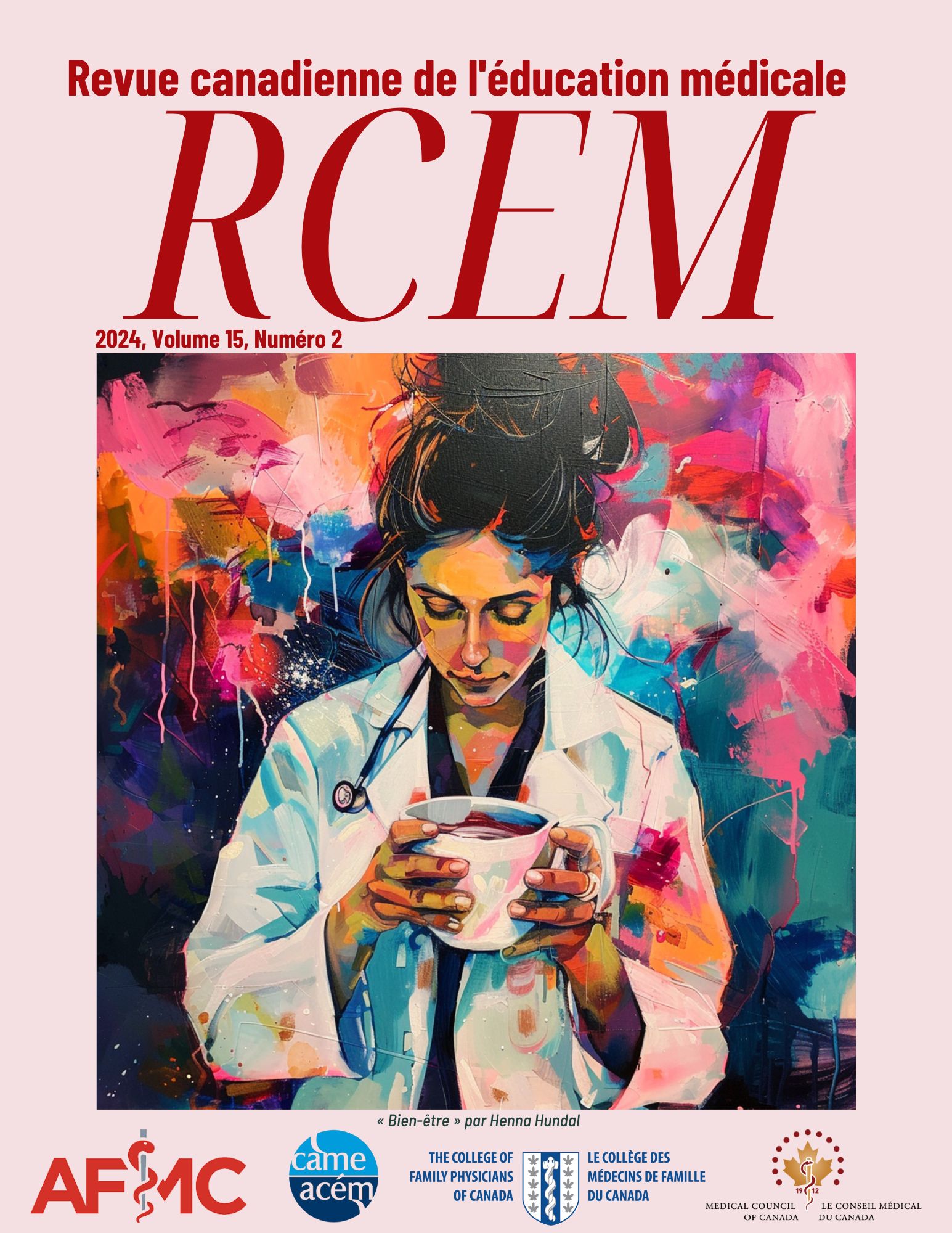Accroître la pertinence et la représentativité de la recherche sur la formation médicale en santé mondiale : une affaire de contexte, de contenu et de point de vue
DOI :
https://doi.org/10.36834/cmej.76686Références
Pritchard J, Alavian S, Soogoor A, Bartels SA, Hall AK. Global health competencies in postgraduate medical education: a scoping review and mapping to the CanMEDS physician competency framework. Can Med Educ J. 2023;14(1):70-79. https://doi.org/10.36834/cmej.75275 DOI: https://doi.org/10.36834/cmej.75275
Paton M, Kuper A, Paradis E, Feilchenfeld Z, Whitehead CR. Tackling the void: The importance of addressing absences in the field of health professions education research. Adv Health Sci Educ Theory Pract. 2021;26:5-18. https://doi.org/10.1007/s10459-020-09966-x DOI: https://doi.org/10.1007/s10459-020-09966-x
Chen X, Li H, Lucero-Prisno III DE, et al. What is global health? Key concepts and clarification of misperceptions: report of the 2019 GHRP editorial meeting. Global Health Res Pol. 2020;5:14. https://doi.org/10.1186/s41256-020-00142-7 DOI: https://doi.org/10.1186/s41256-020-00142-7
King NB, Koski A. Defining global health as public health somewhere else. BMJ Glob Health. 2021;5:e002172. http://doi.org/10.1136/bmjgh-2019-002172 DOI: https://doi.org/10.1136/bmjgh-2019-002172
Abimbola S, Pai M. Will global health survive its decolonisation? Lancet. 2020;396:1627-1628. https://doi.org/10.1016/S0140-6736(20)32417-X DOI: https://doi.org/10.1016/S0140-6736(20)32417-X
Gichane MW, Wallace DD. Dismantling and reimagining global health education. Glob Health Action. 2022;5(1):2131967. https://doi.org/10.1080/16549716.2022.2131967 DOI: https://doi.org/10.1080/16549716.2022.2131967
Brazelton MA. Health for all?: Histories of international and global health. Hist Compass. 2022;20:e12700. https://doi.org/10.1111/hic3.12700 DOI: https://doi.org/10.1111/hic3.12700
Keshri VR, Bhaumik S. The feudal structure of global health and its implications for decolonisation. BMJ Glob Health. 2022;7:e010603. http://doi.org/10.1136/bmjgh-2022-010603 DOI: https://doi.org/10.1136/bmjgh-2022-010603
Kwete X, Tang K, Chen L, et al. Decolonizing global health: What should be the target of this movement and where does it lead us? Glob Health Res Pol. 2022;7:3. https://doi.org/10.1186/s41256-022-00237-3 DOI: https://doi.org/10.1186/s41256-022-00237-3
Philpott J. Training for a global state of mind. Amer Med Assoc J Eth. 2010;12(3):231-236. https://journalofethics.ama-assn.org/article/training-global-state-mind/2010-03 DOI: https://doi.org/10.1001/virtualmentor.2010.12.3.mnar1-1003
Taylor C E. Changing patterns in international health: Motivation and relationships. Amer J Pub Health. 2011;101(7):1213-1215. DOI: https://doi.org/10.2105/AJPH.101.7.1213
Raphael D. A discourse analysis of the social déterminants of health. Crit Public Health. 2011;21(2):221-236. https://doi.org/10.1080/09581596.2010.485606 DOI: https://doi.org/10.1080/09581596.2010.485606
Cheng J, Hanson L. Production of the global health doctor: Discourses on international medical electives. Engag Schol J. 2018;4(1):161-80. https://doi.org/10.15402/esj.v4i1.315 DOI: https://doi.org/10.15402/esj.v4i1.315
Public Health Agency of Canada. Core competencies for public health in Canada (Release 1.0). Ottawa: Public Health Agency of Canada; 2008. Available at https://www.canada.ca/en/public-health/services/public-health-practice/skills-online/core-competencies-public-health-canada.html [Accessed Dec 8, 2022].
Consortium of Universities for Global Health (CUGH) Competency Sub-Committee. CUGH global health education competencies tool-kit (2nd edition). Washington, DC: CUGH Competency Sub-Committee.
Cherniak W, Latham E, Astle B, et al. Visiting trainees in global settings: Host and partner perspectives on desirable competencies. Annals of Global Health. 2017;83(2):359-368. DOI: https://doi.org/10.1016/j.aogh.2017.04.007
Bauer I. More harm than good? The questionable ethics of medical volunteering and international student placements. Trop Dis Travel Med Vaccines. 2017;3:5. https://doi.org/10.1186/s40794-017-0048-y DOI: https://doi.org/10.1186/s40794-017-0048-y
Prasad S, Alwan F, Evert J, Todd T, Lenhoff F. How the social contract can frame international electives. AMA J Ethics. 2019;21(9):e742-748. https://doi.org/10.1001/amajethics.2019.742 DOI: https://doi.org/10.1001/amajethics.2019.742
Khan R, Hodges B, Martimianakis MA, Cole D. Twelve tips for undertaking reflexive global health experiences in medicine. Med Teach. 2017;39(10):1023-1028. https://doi.org/10.1080/0142159X.2017.1333589 DOI: https://doi.org/10.1080/0142159X.2017.1333589
Naidu T. Says who? Northern ventriloquism, or epistemic disobedience in global health scholarship. Lancet Glob Health. 2021;9(9);e1332-e1335. https://doi.org/10.1016/S2214-109X(21)00198-4 DOI: https://doi.org/10.1016/S2214-109X(21)00198-4
Wondimagegn D, Whitehead C, Cartmill C, et al. Faster, higher, stronger – together? A bibliometric analysis of author distribution in top medical education journals. BMJ Glob Health [Accepted]. https://doi.org/10.1101/2022.03.29.22273128 DOI: https://doi.org/10.1101/2022.03.29.22273128
Indigenous Health Writing Group of the Royal College of Physicians and Surgeons of Canada. Indigenous health primer. Ottawa ON: Royal College of Physicians and Surgeons of Canada. 2019.
Canadian Institutes of Health Research, Natural Sciences and Engineering Research Council of Canada, and Social Sciences and Humanities Research Council of Canada. Chapter 9: Research involving First Nations, Inuit, and Métis Peoples of Canada. In: Tri-Council Policy Statement 2: Ethical Conduct for Research Involving Humans. 2022.
Téléchargements
Publié
Numéro
Rubrique
Licence
© Dawit Wondimagegn, Carrie Cartmill, Lidya Genene, Mohammed Ahmed Rashid, Cynthia Whitehead 2023

Cette œuvre est sous licence Creative Commons Attribution - Pas d'Utilisation Commerciale - Pas de Modification 4.0 International.
La soumission d’un manuscrit original à la revue constitue une indication qu’il s’agit d’un travail original, qu’il n’a jamais été publié et qu’il n’est pas envisagé pour publication dans une autre revue. S’il est accepté, il sera publié en ligne et ne pourra l’être ailleurs sous la même forme, à des fins commerciales, dans quelque langue que ce soit, sans l’accord de l’éditeur.
La publication d’une recherche scientifique a pour but la diffusion de connaissances et, sous un régime sans but lucratif, ne profite financièrement ni à l’éditeur ni à l’auteur.
Les auteurs qui publient dans la Revue canadienne d’éducation médicale acceptent de publier leurs articles sous la licence Creative Commons Paternité - Pas d’utilisation commerciale, Pas de modification 4.0 Canada. Cette licence permet à quiconque de télécharger et de partager l’article à des fins non commerciales, à condition d’en attribuer le crédit aux auteurs. Pour plus de détails sur les droits que les auteurs accordent aux utilisateurs de leur travail, veuillez consulter le résumé de la licence et la licence complète.











